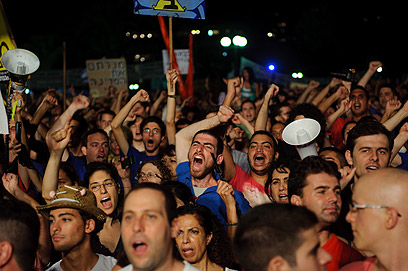
Social protest's white mask
Op-ed: Sephardic protest outside Lapid's home has brought to the forefront sectoral tensions simmering above and below surface of Israeli society
Over the past few weeks a group called the "Not Nice People" has been protesting against the finance minister's budget plan. The group is headed by activists who have been taking part for some two years in various activities in the civil arena and has a clear social agenda and a formulated narrative. Its spokespeople, mainly the female ones, are very familiar with the current economic discussion.
Seemingly, they have everything it takes to generate sympathy among the media and the public, but their focused protest actions have yet to be perceived as a significant media event, and the "Shuster protest" (Shuster is a shopping center in Tel Aviv's affluent Ramat Aviv neighborhood) has received condescending coverage from reporters and some columnists who have even doubted the justification of its cause and criticized the activists' methods while oddly focusing on the inconvenience caused to Minister Lapid's neighbors. Some even stereotypically categorized it as a "loud" protest.
One cannot help but sense that Stav Shaffir and Daphni Leef, as the symbols of the social protest in the summer of 2011, received much more support and empathy than the leaders of the "Shuster protest" do.
The reasons why the "Not Nice" protest is not receiving the recognition and coverage it deserves are linked to the acceptance of their message and the stereotypical perception of public opinion leaders and groups that tend to adopt hegemonic worldviews. "Not Nice People" is the term used by Golda Meir to describe the "Black Panthers" after meeting with them to discuss their demands. The link between this historic term and the current group is responsible in part for the Shuster activists' position in the protest arena. Israelis associate the term "Not Nice People" with Sephardics, the periphery, the struggle against poverty, radical fringes, lack of trust between protesters and the regime, class-related tension and ethnic rage.
As opposed to the neo-liberal economic outlook and hegemonic cultural stance which put the protest of the weak in a negative light, the current group adopted the name "Not Nice People" in a subversive political act of self-representation. They are all Sephardics, arrive from the marginal lines of Israeli society and demonstrate, first and foremost, against the harm caused to those groups which Yesh Atid leader Lapid has blatantly ignored, for strategic reasons, since the beginning of his political career.

Social protest in summer of 2011 (Photo: Ben Kelmer)
The protest of the "Not Nice People" is not mediated by cultural capital. They are not connected to people in positions of power and have no cultural recognition. They also speak their mind without holding back and, most importantly, without wearing a white mask in order to pass by the gatekeepers of the hegemony. Their dark, piercing glance is directed at one of the elite's most prominent representatives.
At that symbolic moment when the members of the "Not Nice People" group gathered outside Lapid's home for the first time, their protest immediately activated the old disc; the same disc which plays the painful story of protest politics in Israel and its connection to the endless, historic injustice caused to the neighborhoods and development towns, as well as to the weak and excluded groups.
With their piercing gaze at Lapid's home, the "Not Nice People" bring to the forefront the socioeconomic and sectoral tensions that simmer above and below the surface of Israeli society; the gaps between the "nice and "not nice" and between "them" and "us."
Against the background of this complexity, part of the middle class, which used to pour into Rothschild Boulevard, voted for Yesh Atid and is now expected to get hurt by the Treasury's plan, has a dilemma: On the one hand, it wants to undermine the disappointing regime, but on the other hand the groups that were dominant during the Rothschild protest, as well as most of the people in the media, do not identify with the display of peripheral protest that has taken over and are reluctant to join it.
The fact is that the Ashkenazi protest leaders will not be able to recruit the residents of the neighborhoods, and the Sephardics from the neighborhoods will not be able to recruit the members of the Ashkenazi middle class who took part in the social protest on Rothschild. The rules of the tribal politics in Israel determine a zero-sum game that will be resolved only by some magical alternative political formula.
Dr. Merav Alush Levron is a lecturer at Tel Aviv University's Film and Television Department










